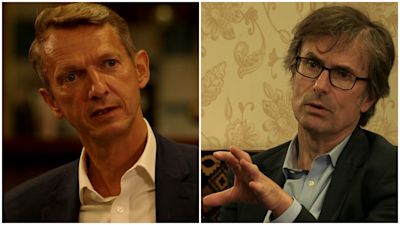Coronavirus: Risk of 'long-term scar' on UK if people stay unemployed for too long, says Bank of England chief economist

The Bank of England's chief economist has told ITV's Tonight there will be a "long-term scar left if people are allowed to remain unemployed for too long" because of the coronavirus pandemic.
Andy Haldane told ITV News Political Editor Robert Peston how the long-term effects of unemployment will affect communities, families and the economy.
Mr Haldane's role and the way he views the economy has a huge influence on the interest rates we pay and how the public understands the economic impact of the coronavirus crisis.
ITV's Tonight programme took the chief economist back to the Guiseley Comprehensive School he attended in West Yorkshire.
When asked what it was like growing up in Yorkshire in the early 1980's, Mr Haldane told Robert Peston: "We remember 1980s UK, a pretty grim time, economically and socially."
"What 3,000,000 people at the peak without work at every part of the country, particularly places like this were very hard-hit by all that," he added.
Mr Haldane said the recession was "impossible to avoid, whether it's your classmates at school, I was lucky, my dad retained his job and lots of my friends' dad's lost their jobs."
From solicitor to plumber: How people are retraining to cope during coronavirus pandemic
Unions and business leaders back MPs’ call for furlough scheme extension
He added: "It left scars on people, you could see the dark cloud hovering over families and that was a formative experience for me - what the economy really means and why it really matters?"
The Guiseley Factory Workers club is all that is left from the town's industrial glory days.
It's a reminder that the recession, like the one we are facing today, can lead to a permanent change and can come at a permanent cost.
Watch the full interview with Andy Haldane
Mr Haldane said: "If you're not careful, those that are displaced from work there's a long-term scar left if you like for the individuals, for their families, for communities and for the economy if people are allowed to remain unemployed for too long a period."
When asked if this is a temporary crisis or whether we are seeing a long-term reorganisation of the economy, Mr Haldane said: "There's a very good chance this crisis will give the hurry up to some of what were already deep-seated structural trends in the economy, even before Covid."
"I think the reorientation of business towards a more digitised business model...is an effective and often cheaper medium," he added.
"Businesses will need to reinvent themselves fairly fundamentally to survive and thrive. Yes, the travel sector will need to think afresh about its business model, yes, parts of the hospitality and leisure industry and parts of the retail sector will need to think afresh - there is more to come."
Mr Haldane argues the UK economy today is more flexible than in the 1980s, which should help the current crisis spurred by the pandemic.
He said: "This crisis provides the opportunity to rethink our approach to business to skills to digitisation to AI [artificial intelligence], and it's for us to seize that opportunity, as it was at the end of the second world war.""I've been quite reassured that during this crisis how quickly governments and central banks have responded, how quickly businesses and indeed workers have adapted their way of working so I've got some hope that the searing experience of the Covid crisis may have flexed that muscle, the ability to change at greater pace than in the past."
'Can We Save Our Jobs? Tonight' is on Thursday 24 September at 7.30pm on ITV